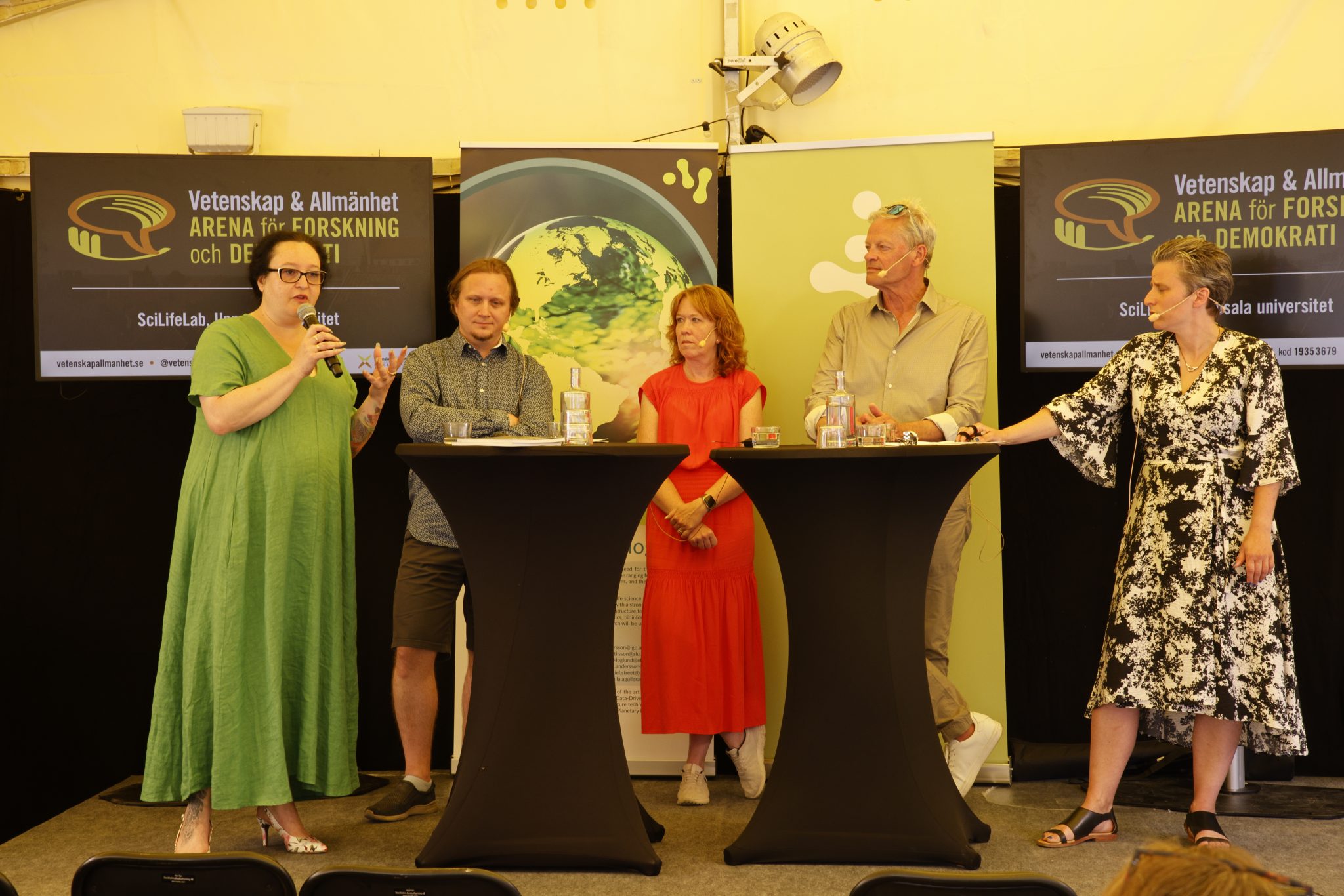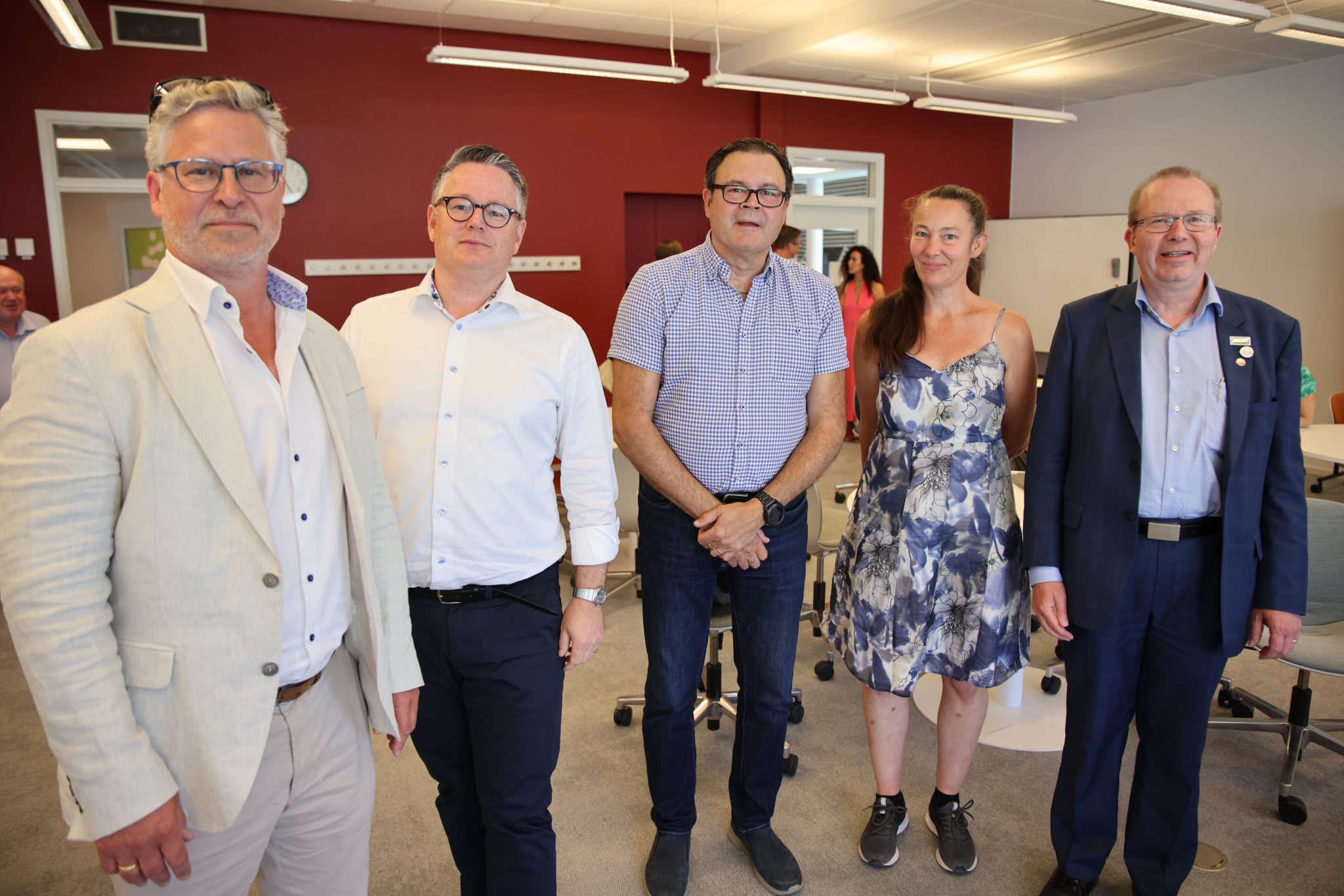SciLifeLab contributes to the 2024 democratic meeting place in Almedalen
For the third year in a row, SciLifeLab took active part in the democracy meetings in Almedalen, arranging four panel discussions, and actively engaging as panelists and discussion partners in seminars arranged by other organizers.
Global sustainability
During the panel debate titled “The biodiversity crisis threatens sustainability and the bioeconomy – can Swedish research be the solution?“, key points were highlighted regarding the urgent need for action and collaboration. The panel emphasized the importance of fostering innovation and cooperation between academia, industry, and policymakers to effectively address the biodiversity crisis. Utilizing existing research infrastructure, such as SciLifeLab, and environmental monitoring of genetic diversity were identified as crucial steps toward finding solutions.
The urgency of the situation was underscored by the alarming rate at which species are being lost, outpacing the time available to study and understand them. The panel stressed the importance of harnessing the strength of existing Swedish research to develop constructive solutions for the biodiversity crisis. Furthermore, improved cooperation was highlighted as essential, not just within individual sectors but also across different actors, including governmental stakeholders. New methods and enhanced cooperation among all these partners are vital to tackle the crisis comprehensively.
“We must take advantage of the research and infrastructure that is already in place. Environmental monitoring of genetic diversity offers solutions! The spruce is facing extinction in Sweden due to its existence as a monoculture in managed forests, lacking biological diversity within the species. We must harness the available Swedish research to develop constructive solutions”, said Olga Vinnere Pettersson, Scientific Lead for Planetary Biology at SciLifeLab.

Olga Vinnere Pettersson took part in the panel of the seminar “How does the life science industry ensure the health of both humans and the planet”, arranged by RISE, Medtech4health, Lif, Swedish Medtech. The life science industry is a cornerstone of human health and a vital sector for Sweden. However, there is growing concern about the potential trade-off between human health advancements and the planet’s well-being. The seminar delved into the pressing issue of sustainability within the life science industry, highlighting the potential conflict between human health and the health of our planet. While the life science sector is crucial for global health, providing essential products for treating various conditions, it also poses significant environmental challenges. The seminar explored possibilities to maintain a competitive life science industry while safeguarding ecosystems and mitigating climate change.
The discussion covered the environmental impacts of pharmaceuticals, including the escape of certain drugs from environmental regulations and the carbon footprint of medical products like inhalers. The seminar also highlighted efforts by industry stakeholders to promote sustainability.
Olga Vinnare Pettersson underscored the delayed effects on biodiversity and the necessity of evidence-based, transparent approaches in green sustainability. She stated, “Nature doesn’t care about political decisions or economic issues. By the time we notice the impact on biodiversity and ecology, it’s often too late.” She also emphasized that SciLifeLab has methods to set up biomonitoring and welcomes companies to make contact for collaborations.
The seminar concluded that while the life science industry faces significant sustainability challenges, collaboration between academia, industry, and policymakers can foster innovations that balance human health and environmental protection. Transparency and rigorous evidence-based practices will be crucial in driving the industry towards a more sustainable future.
“Sustainability and green issues are incredibly multifaceted topics. The role of biological diversity cannot be overlooked, and it is encouraging that companies take an interest in this, as well as in the issue of AMR – antimicrobial resistance – and hormone emissions in nature” said Olga Vinnere Pettersson.
Pandemic preparedness
SciLifeLab’s Pandemic Laboratory Preparedness Capability hosetd a seminar titled Preparing for the Next Pandemic – How Do We Retain and Develop Crucial Laboratory Skills and Technology? Now that the COVID-19 pandemic has entered a post-pandemic phase, it is time to prepare for new pandemics that will affect us in the future. In late 2020, SciLifeLab was commissioned by the government to develop pandemic laboratory preparedness, and has since established national capacity in Sweden to handle future pandemics and other biological threats through the PLP program. At the Almedalen seminar, representatives from the Public Health Agency, the Swedish Defence Research Agency (FOI), the Pharmaceutical Industry Association (LIF), SciLifeLab, and the Virus and Pandemic Fund discussed how to ensure that laboratory capacity and expertise are maintained and further developed for the next pandemic.
“We reached a strong consensus on the necessary actions and identified several key conclusions”, said Staffan Svärd, Scientific Lead – Pandemic Laboratory Preparedness at SciLifeLab, and continued: “The next pandemic will also require extensive testing and contact tracing, and our societal preparedness for this needs improvement. Therefore, we must retain and enhance knowledge and capacity for future pandemics. It is essential to continuously research and follow up on the pandemic, including diagnostic methods, antivirals, vaccines, etc. Collaboration among various stakeholders is crucial in this work, and we need to establish frameworks for this. Maintaining preparedness will incur costs, but long-term financing is essential for maintaining readiness”, said Staffan Svärd.
Digital infrastructure for precision medicine
SciLifeLab further arranged the seminar “The Future of Healthcare and Research is Enabled by European Investment in Genomic Data” to highlight the need for digital infrastructure to make genomics data accessible. For improved precision medicine and a deeper understanding of genetic variation, Europe is working together to provide researchers and doctors with access to critical genomic data. With legislation on health data and secure data access, new opportunities for future healthcare and research are emerging.
“We are creating the digital infrastructure to make genomic data accessible, enabling personalized therapy and enhancing research and innovation”, said Bengt Persson, SciLifeLab (UU), NBIS, ELIXIR.

At the seminar “How can large-scale molecular analyses lead to precision health?” discussions focused on how the introduction of new technologies for precision health in healthcare can be facilitated and how SciLifeLab can contribute. The seminar was arranged by SciLifeLab Precision Medicine Capability.
The panel emphasized the importance of collaboration between academia and healthcare, identifying shared flagship projects. It was noted that SciLifeLab has already played a significant role, contributing through its Clinical Genomics platform to over 90,000 advanced genetic analyses in healthcare in 2023. The panel also highlighted that SciLifeLab is a crucial driver for the development of new technologies and IT infrastructure.
“SciLifeLab has changed my life – when I started as a clinical geneticist 25 years ago, the opportunities offered by SciLifeLab didn’t exist at all. Continue in the same direction, focusing on collaborating with healthcare and setting shared goals,” said Richard Rosenquist Brandell, Professor and Chief physician, clinical genomics, Karolinska Institutet, Karolinska Universitetssjukhuset, Genomic Medicine Sweden.
Challenges mentioned included the differing timelines between research, where projects often take many years, and healthcare, which operates on short-term budgets. There was also discussion on the issue of focusing on prevention, as Swedish healthcare traditionally prioritizes treating the most severely ill patients first.
The panel also explored the economic aspects of introducing more analyses into healthcare. It was noted that molecular analyses are becoming increasingly affordable and that diagnostics represent a very small part of the overall healthcare costs. Improved diagnostics can lead to more efficient use of healthcare resources by avoiding unnecessary treatments for patients. Additionally, there was a call for new health economic models that consider how appropriate treatments and preventive measures can lead to savings in many areas of society.
Precision medicine was high on the agenda in Almedalen also this year as Sweden faces the challenge of developing more and better cancer treatments. This was the main topic during the seminar “How should future clinical trials be designed to improve cancer care? organized by Genomic Medicine Sweden (GMS) and Zero Vision Cancer – Testbed Sweden Precision Health Cancer. Targeted therapies are becoming increasingly important in cancer treatment. For more patients to benefit from these therapies, national collaboration and advanced diagnostics are required. Currently, several national and international studies are exploring new applications for already approved treatments, which helps integrate precision medicine more rapidly into healthcare. The healthcare needs new diagnostic tools, increased data sharing, and scale up efforts. Achieving this requires collaboration between healthcare, patients, patient organizations, industry, academia, and policymakers.
Sweden needs to develop and implement a wide range of analyses that can identify innovative combination therapies. SciLifeLab, as the largest national research infrastructure for life sciences, provides unique technologies that stimulate national and international collaborations. There is enormous potential and a strong will to make clinical treatments available to patients and even to follow up on patient outcomes over time.
A revision of the national cancer strategy is currently underway to ensure that Sweden continues to have the necessary conditions to remain a leader in cancer care. Additionally, the Swedish Medical Products Agency has recently been tasked with proposing how improved conditions and increased capacity for more clinical trials can be established in Sweden to further promote our competitiveness in clinical trials of new drugs and treatment methods.
“In precision medicine, new effective therapies combining targeted treatments and immunotherapy are crucial for major leaps towards cure; this needs major efforts in precision diagnostics to select right combinations for each individual patient” said Janne Lehtiö, SciLifeLab Scientific Lead for Precision Medicine at SciLifeLab, who was in the panel at the seminar.
Efforts towards precision medicine come side by side with discussions on health care economics, and Swedens national roadmap for precision medicine addresses several challenges. How far have we come, and what remains to be done to implement precision medicine in Swedish healthcare? This was discussed at the seminar “Precision medicine – cost or investment” arranged by Karolinska Comprehensive Cancer Center (CCC), Precision medicine centre Karolinska (PMCK) at Karolinska Institutet, and, Karolinska University Hospital, where SciLifeLab’s Päivi Östling was in the panel.
“We urgently need bold initiatives to implement precision medicine in Sweden. We have many excellent components in place that need to be integrated with a clear vision and evaluation of approaches. We can’t afford to wait for more investigations; we need to work practically to find the right distribution of roles among the state, regions, healthcare, patients, industry, and academia. Precision medicine requires entirely new working methods and the capability for data sharing, and it needs to find its implementation form specifically tailored for Sweden” said Päivi Östling, Scientific Lead for Precision Medicine at SciLifeLab, panelist at was in the panel at the seminar.
Research infrastructure
SciLifeLab Infrastructure director Annika Jenmalm Jensen participated in a panel discussing how universities and companies in collaboration can strengthen Sweden as a research nation. The seminar focused on the critical need for world-class equipment to achieve world-class research, highlighting the risks posed by slow bureaucracy and insufficient funding. It explored whether innovative collaboration models, where companies share cutting-edge technology with universities, could enhance Sweden’s position as a research nation.
There is a need for increased transparency and clear agreements, particularly regarding data ownership and legal responsibilities since effective alliances between universities and companies are crucial for success. Funding and long-term financial stability are essential for sustaining impactful research.
Life science research and innovation usually have long time lines between discovery and final benefit. Educating the public and policymakers about the importance and benefits of life sciences is crucial.
“SciLifeLab collaborates and serves annually with 100 unique companies. We will continue with that, and simultaneously facilitate increased collaboration by clarifying pricing and contract writing” said Annika Jenmalm Jensen, SciLifeLab Infrastructure Director.
In conclusion, SciLifeLab’s active participation in Almedalen 2024 underscored its role in advancing key discussions on global sustainability, pandemic preparedness, and the future of precision medicine in Sweden. Emphasizing collaboration across sectors and the urgent need for innovative approaches, SciLifeLab continues to lead in integrating cutting-edge research and technology to address pressing healthcare and environmental challenges.





